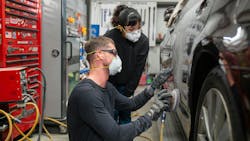Unlocking Career Success with I-CAR’s Two-Year Apprenticeship Initiative
Key Highlights
- The program is ideal for Gold Class shops committed to ongoing employee development and industry standards.
- There are no costs to explore eligibility or get guidance; incentives can help cover training and tool expenses.
- A two-year curriculum aligns with Department of Labor standards, encouraging technician retention and professional growth.
- Administrative support from I-CAR simplifies program implementation, reducing the burden on small shops.
- Funding and incentives are available on a first-come, first-served basis, with ongoing updates from government sources.
I-CAR’s national Registered Apprenticeship Program is the latest development for collision repair industry workforce development, designed to train someone with no foundational knowledge to be a competent professional.
The two-year structured training program delivers a nationally recognized credential from the U.S. Department of Labor using paid, on-the-job learning and related technical instruction.
Last year, the U.S. Department of Labor designated I-CAR a National Apprenticeship Hub, which enables the organization to provide incentive packages to qualified shops on a first-come, first-served basis. The packages can help shops get the tools they need and cover costs to lessen the financial burden of apprenticeship. Interested shop owners and operators can complete an inquiry form at i-car.com/registered-apprenticeship. Dara Goroff, vice president of planning and industry talent programming at I-CAR, spoke with FenderBender about what shops would fit the program, how much it costs, and the challenges they might face when taking on an apprenticeship.
Editor's Note: This interview has been edited for length and clarity.
FB: Is there a typical profile for a type of shop or where this works well and where it wouldn't?
The ideal shop would be a shop that's Gold Class already because we know two things if they're Gold Class: We know that they've committed to a lifetime of learning for their employees, and they really believe in employee development. The second thing is we know that they have representatives for all the required roles in the industry. So, they're likely to be able to convey the right knowledge to somebody who's entry level.
As long as a shop is Gold Class, they don't really need to have done anything to prepare for registered apprenticeship. We will want them — and the Department of Labor wants them — to have a one-to-one mentor-to-apprentice relationship. When they're ready to onboard an apprentice, they will have to have a designated mentor, but we have tools that can help them get there. If they’re interested and they’re Gold Class, my recommendation is for them to reach out to our program administrator or one of our representatives in the industry who will get them to the right place.
FB: Is there a cost or obligation to see if I’m going to be a good candidate?
There is no obligation at all. There's no cost to talking to Jen, our admin. We will work through not only what you need to do in your shop to get ready for this, but also the Department of Labor's requirements. None of that is at a cost to the shop. My thought is that we will have shops that are not yet Gold Class, but they're on the pathway and they're really close. [They] want to talk to somebody at I-CAR before they truly are ready so that they know as they're laying the foundation…they can also keep an eye out for who's a viable mentor and what they have in their shop to help them train in an entry-level technician.
FB: What would be the biggest challenge to a shop owner or operator implementing an apprenticeship program?
You need a program that the industry validates that it brings an apprentice up to the skill levels that are transferable to any employer in that industry. I think one of the reasons it's kind of hard to start a program is it's especially hard for an individual employer who's really focused on fixing cars to go to the Department of Labor and say “I can set an educational standard that other shops would believe in”…The second thing is the administrative work. The Department of Labor wants to make sure that the program that they're offering as a registered apprenticeship is successful. Any employer participating in a program normally would have to report back to the Department of Labor at regular intervals...I think generally, if you're not a larger employer, it's hard to say I'm going to hire somebody who's just going to administer this program or make sure that my apprentices are hitting the right milestones. We've taken away that barrier, too, because our administrator will help with all those things.
FB: What would the program cost?
Well, it's going to be hard to answer that, not because I'm equivocating. The cost is variable based on what the employer needs. The incentives can cover the cost of the culture assessment, the mentor apprentice-matching, the tools for up to three apprentices at a location, and, once they accept an incentive package, we're providing the two years of curriculum. The two years of curriculum is variable because if you're going into a large shop, that's going to have numerous people going through it. It costs more than if you're going to a small location. I don't mean to hide the cost. It's kind of hard to give a ballpark, but if someone's interested in us, reach out to us as soon as possible because we do have those incentives available. The Department of Labor has funded quite a few packages, and they are available on a first-come, first-served basis.
FB: You mentioned two years. Is that standard?
That is the standard for the apprenticeship. That is exactly what we offer to cover as far as the curriculum [is concerned]. We know from the Department of Labor data and statistics that they've shared with us, employees going in as apprentices are mindset-wise more likely to stay with the employer because they see the end of the finish line in front of them. But we also have found…more people interested in applying because they know it's a two-year program. They feel like they're going to be given time to learn and that they're going to progress to something that truly is meaningful as a profession.
FB: Any final thoughts or comments?
So, this is an important thing to note for employers who have looked and tried to find grants and funding, and they haven't seen anything available in their state. It's important to create a relationship that can help you find the things that are available, because the government changes all the time. We're constantly on the hunt to see what's available for those running a Department of Labor Registered Apprenticeship program…It isn't like if you look once, "My state doesn't have anything for this." They're constantly changing for the good of our industry, and I think this country needs to invest in skilled trades. I think, no matter what party is in office, we're going to see a resurgence of interest in the skill trades.
About the Author
Peter Spotts
Associate Editor
Peter Spotts is the associate editor of FenderBender and ABRN. He brings six years of experience working in the newspaper industry and four years editing in Tech. He has a bachelor's degree in journalism from Western New England University with a minor in integrated marketing communications and an MBA. A sci-fi/fantasy fan, his current 2010 Honda Civic is nicknamed Eskel, after the character from the Witcher book series, for the scratch marks on its hood.
Don't miss Peter's next article. Sign up for FenderBender Today's Collision Repair News here.


